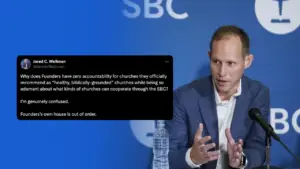Alexandra Alter wrote an article on church discipline that was published in the January 18, 2008 edition of the Wall Street Journal. It is ominously entitled, “Banned From Church.” While I applaud the WSJ’s effort to examine the “growing movement among some conservative Protestant pastors to bring back church discipline” it is regretable that the article wasn’t written by someone with more understanding of the subject at hand.
For example, Alter describes church discipline as “an ancient practice in which suspected sinners are privately confronted and then publicly castigated and excommunicated if they refuse to repent.” Doesn’t that sound just like what Jesus prescribes in Matthew 18:15-18? Ms. Alter says that this passage teaches that “unrepentant sinners must be shunned.”
Given this gross misunderstanding of the subject it comes as no surprise that the examples that are cited in the story tend to so extreme that most pastors I know who teach and lead their churches to practice discipline would not want to be identified with them. For example, Alter writes about a pastor who dialed 911 on two different occasions to have a 71 year old excommunicated woman arrested for sitting in a church service (the audio of the first 911 call is even embedded in the online text). As reported, this was not a biblically defensible action.
When a person is removed from the membership of a church in keeping with our Lord’s teaching in Matthew 18, he or she is not to be “shunned.” Neither should they be forbidden to sit under the public preaching of the gospel. They need the gospel and, while we cannot treat them as members any longer, we should welcome them the same way we would a “Gentile or tax collector” (in other words, an unbeliever). We recently had a member who was excommunicated several years ago show up for a worship service. I was glad he was there and told him so. I prayed for him during the worship, that God would capture his heart with the gospel. This is far from the caricature that is portrayed in the WSJ.
The article sites Southern Baptist pastors Jeff Noblitt of First Baptist Church of Muscle Shoals, Alabama and Al Jackson of Lakeview Baptist Church in Auburn, Alabama as men who lead their churches to practice discipline. They are not quoted at length and, I suspect, were far too sane in the comments to be judged worthy of extensive coverage.
There is a difference in church discipline and “pastor discipline.” I have known of a few cases where overly zealous pastors tried to remove problem members in the name of church discipline. But, because their congregations had not been adequately taught and were not fully on board with the process, it really wasn’t “church” discipline at all.
One of the first things a faithful pastor must do when he finds that a church has neglected the practice of corrective church discipline is teach. He must carefully explain passages like the one cited above and 1 Corinthians 5. Then he must teach some more. And then some more. He must lead the membership to see and embrace what the Bible says about the integrity of a church’s identity and testimony as the body of Christ. Only after a congregatoin has been adequately taught can they be expected to properly carry out the practice of church discipline.
Where this goal is intentionally pursued with patience and love, the practice often can be reinstituted in a healthy, God-honoring way. This is one of the greatest needs in American evangelical churches in our day. While caricatures must be avoided and abusive practices must be rejected, the engagement of loving oversight and accountability breeds vitality and unity in a church.
Anyone who reads only the WSJ article and does not investigate what the Bible actually says about this issue will never know this. But those who care enough to find out what God actually says in His Word, and not merely what others think He has said, will discover that this kind of relational devotion to one another is one of the great blessings of the church.




















